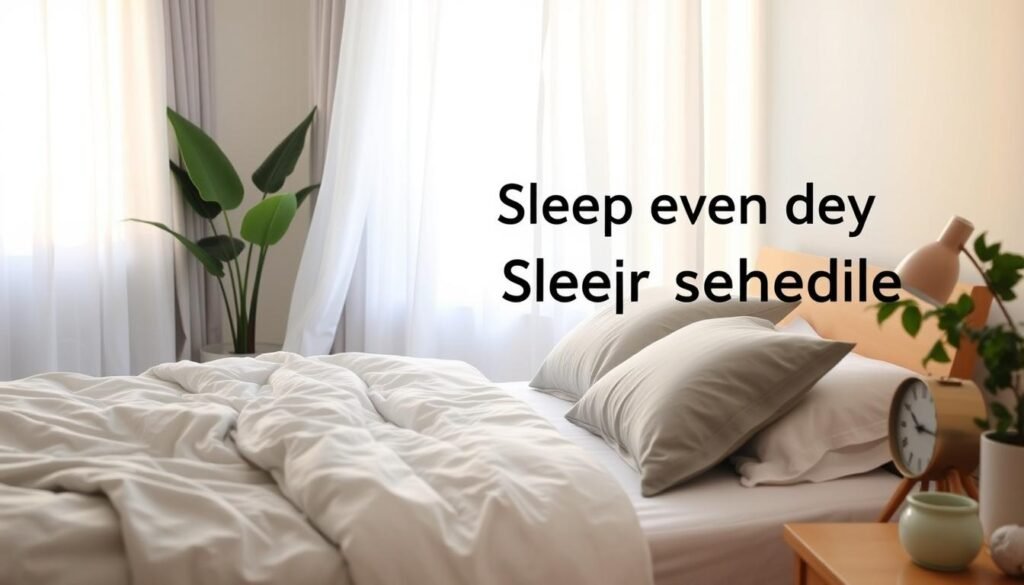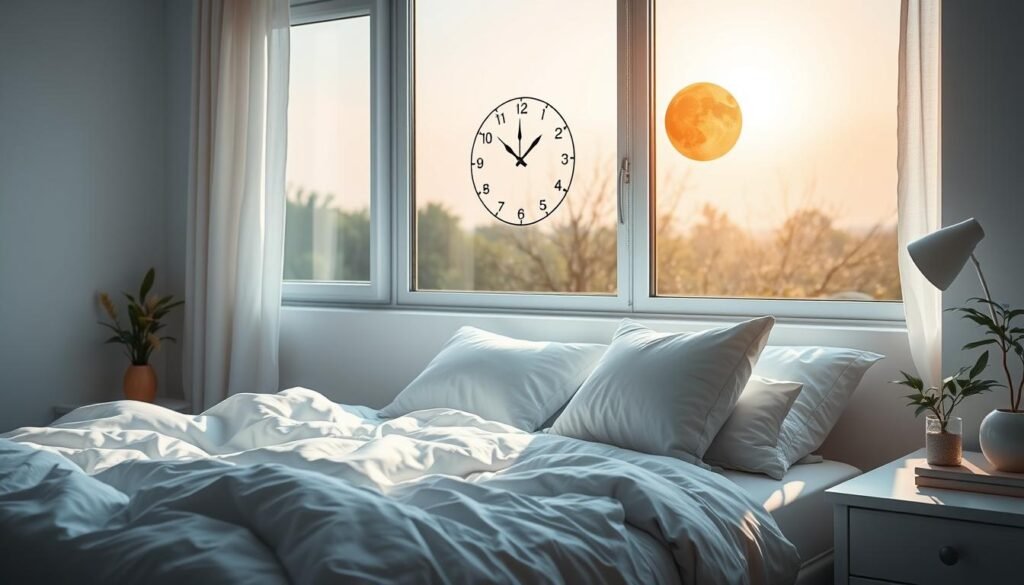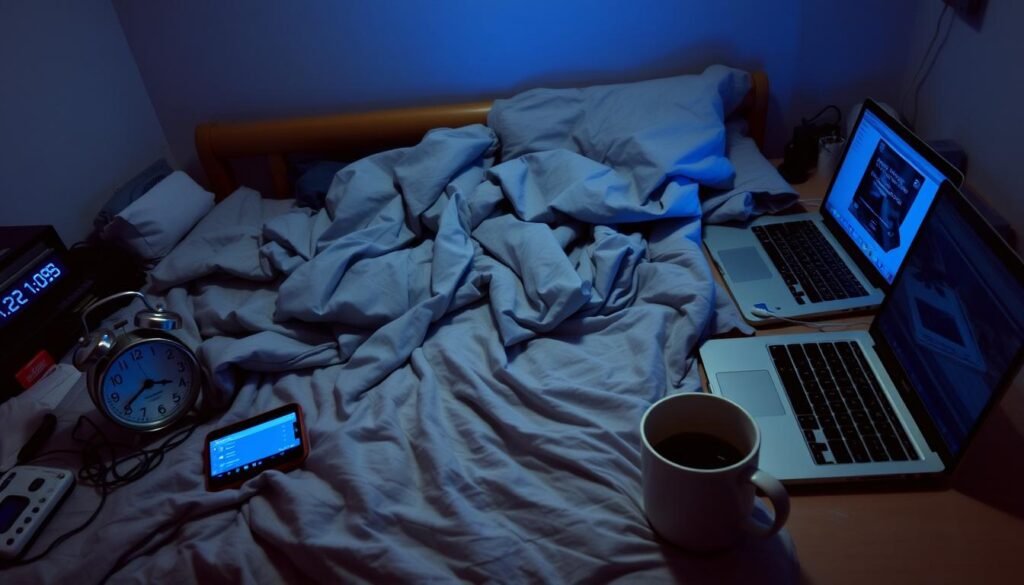Research shows a big part of the U.S. doesn’t sleep enough. This results in one-third of Americans not getting the rest they need. This fact points out the issues with bad sleep habits and uneven sleep schedules. These issues can cause a lot of health problems, such as insomnia and poor sleep quality. It’s very important to understand sleep hygiene to get better at dealing with these issues.
People can tackle sleep problems by knowing what causes them. Strategies like sticking to a regular bedtime, enjoying calming activities before bed, and making your sleep area more inviting can truly help. For those facing ongoing sleep issues, this helpful article gives great advice and tips. It’s a good guide for building better sleep practices.
Key Takeaways
- Setting a consistent sleep schedule is vital for better sleep quality.
- Avoiding heavy meals before bedtime can aid in improving sleep.
- Practicing relaxation techniques can help reduce stress and improve sleep.
- Regular moderate aerobic exercise can enhance sleep quality.
- Eliminating loud noises in the sleep environment contributes to better sleep.
- Daytime napping, especially in the afternoon, should be minimized to regulate nighttime sleep.
Understanding Sleep Hygiene
Sleep hygiene includes habits and environments that affect sleep quality and length. Those with bad sleep hygiene may face trouble falling asleep, night wakings, and tiredness during the day. Studies have found that 76.5% of people with sleep issues had poor sleep hygiene. This compares to 56.1% who had better habits.
To improve sleep, having good habits is vital. You should try to sleep and wake up at the same time each day. Adjusting your schedule slowly helps your body adapt. Taking short naps is okay but do them at the right time so they don’t affect your night sleep.
Your sleeping environment plays a big role in how well you sleep. Important parts of this include:
- Comfortable mattress and bedding
- Optimal room temperature
- Blocked light and minimized noise
- Calming scents like lavender
Studies have shown high sleep hygiene scores link to more depression cases (75.8% vs. 59.6%). This shows the need for a good sleep setting and habits.
Creating a calming routine before bed helps your brain get ready for sleep. Spend 30 minutes on relaxing activities, stay off electronics, and avoid bright lights before bed. These actions help your brain make melatonin, which you need for sleep, and create a restful setting.
Regular exercise also helps you sleep better and stay in sync with your body’s natural clock. Knowing how sleep hygiene affects health lets people enhance their sleep habits. Better sleep habits can greatly improve sleep quality and how alert you feel during the day. This shows the big impact of practicing good sleep hygiene.
The Importance of a Consistent Sleep Schedule
Having a consistent sleep schedule helps regulate your body’s internal clock. It also improves your overall sleep quality. People with irregular sleep patterns face big health risks, like heart problems.
In a study with over 2,000 adults, those with irregular sleep had more artery issues. These issues are early signs of heart disease. Changing sleep time by two hours led to more artery plaque, showing consistency is key.
Experts say setting fixed bed and wake times helps avoid sleep issues. Shifting sleep schedules can mess with your body clock. This leads to “social jet lag.” Challenges like night shifts and social events can disrupt sleep, but it’s important to keep it regular.

Sticking to a regular sleep schedule lowers your risk of dying early. The most consistent sleepers had a 20% to 48% lower death risk. Being in the consistent top 40% also means fewer deaths from heart disease, cancer, and other causes.
The regularity of sleep is more important than how long you sleep. Even six hours, if regular, is better than an uneven eight hours. For your best health, aim for 7 to 9 hours of sleep. Keep your sleep and wake times the same, even on weekends.
To learn more on better sleep routines, visit this link.
The Role of Circadian Rhythm in Sleep Hygiene
The circadian rhythm acts as our body’s internal clock, guiding our sleep-wake cycle and other vital functions. It follows a 24-hour cycle, highly influenced by the light and dark. Keeping this rhythm in check is key to our health and happiness.
Natural light is crucial for controlling our sleep. It tells our body when it’s time to get ready for sleep by making more melatonin. But modern habits, like looking at screens too much at night, can mess this up and hurt our sleep quality.
When our circadian rhythm is off, we might face sleep issues and feel moody. Deep sleep is super important for healing our bodies and strengthening our immune system. Good sleep makes us healthier all around.
To keep our sleep-wake cycle healthy, we can:
- Be outside in the daylight
- Avoid bright screens in the evening
- Stick to a bedtime routine
Doing these things can boost our melatonin and get our circadian rhythm in harmony with day and night. This leads to better sleep and health.

| Healthy Habits | Negative Impacts |
|---|---|
| Exposure to natural light | Prolonged screen time before bed |
| Consistent sleep schedule | Irregular sleep patterns |
| Relaxing bedtime routine | High-stress activities at night |
| Limit heavy meals in the evening | Consuming caffeinated beverages late in the day |
Common Causes of Poor Sleep Hygiene and Irregular Sleep Schedules
Many factors can lead to poor sleep hygiene and irregular sleep patterns. Lifestyle habits, like too much screen time before bed, disturb our circadian rhythm. The effects of caffeine and alcohol are also significant; despite their social benefits, they can harm our sleep.
Health issues add more complexity. Conditions such as asthma, chronic lung diseases, and fibromyalgia affect sleep disorders. Those with periodic limb movement disorder (PLMD) or narcolepsy face challenges with good sleep and feeling rested during the day. Addressing these health problems is key to better sleep hygiene.
Psychological factors also deeply impact sleep. Stress, anxiety, and emotional issues, especially in high-pressure settings like college, are major problems. For instance, a study found that 67.2% of college students in Turkey struggle with sleep due to psychological issues.
Our environment plays a big role too. Sleep can be ruined by outside noise, poor air quality, and bad smells. Many students are concerned about tobacco smoke in their sleeping areas. This makes healthy sleep patterns harder to maintain.
Knowing what contributes to poor sleep helps us fix our sleep habits. Here are some examples:
- Working irregular shifts disrupts sleep.
- Jet lag messes with our circadian rhythm.
- Socializing leads to inconsistent sleep times.
- Stress and worries make it hard to relax before bed.

| Factor | Impact on Sleep Quality |
|---|---|
| Lifestyle Habits | Excessive screen time, caffeine, and alcohol intake |
| Health Conditions | Chronic lung diseases, PLMD, and narcolepsy |
| Psychological Issues | Stress, anxiety, and emotional problems |
| Environmental Factors | Noise, air quality, and exposure to tobacco smoke |
Understanding these causes is vital for improving sleep hygiene and fighting sleep disorders. By tackling outside factors and personal habits, people can enjoy better sleep and health.
Strategies to Improve Sleep Hygiene
Making small changes can greatly improve sleep hygiene and overall sleep habits. Better sleep quality and length are key for good health.
Establishing a Fixed Wake-Up Time
Having a consistent wake-up time helps set your body’s internal clock. This makes it easier to go to sleep and wake up when you want. Setting a regular wake-up time fights the issues that come from sleeping at different times, especially for busy people.
Creating a Relaxing Bedtime Routine
Having a bedtime routine can make it easier to fall asleep. Doing things like reading, meditating, or gentle stretching tells your brain it’s time to rest. It’s also good to avoid screens before bed to get deeper sleep, which is part of good sleep hygiene.
Optimizing Your Sleep Environment
It’s important to make your bedroom right for sleeping. A dark, cool, and quiet room can help you get the kind of sleep that leaves you feeling refreshed. Using comfy bedding and reducing noise and light helps promote better sleep habits. Learn how to create the perfect sleep environment.
| Sleep Hygiene Strategies | Benefits |
|---|---|
| Establish a consistent wake-up time | Regulates body clock, improves sleep regularity |
| Create a relaxing bedtime routine | Promotes relaxation, signals it’s time to sleep |
| Optimize the sleep environment | Enhances the likelihood of restful sleep |
| Avoid caffeine and large meals before bed | Reduces sleep disturbances |
| Incorporate relaxation techniques | Calms the mind, improves sleep quality |
How to Correct Poor Sleep Hygiene and Irregular Sleep Schedules
To fix bad sleep habits and erratic sleep schedules, start slow. Make little changes like adjusting bedtime by 15 to 30 minutes. This helps the body adjust without feeling overwhelmed. It’s a step towards better sleep timing.
For good health, get at least seven hours of sleep every night. A steady sleep schedule helps control your body clock, affecting your health. Things like shift work, jet lag, and too much artificial light can mess this up. Fixing these can improve your sleep.
Being patient is key. Stick to a set wake-up and bedtime, even on weekends. This strengthens your sleep cycle. Morning light helps reset your body clock, aiding better sleep. A good sleep routine includes:
- Maintaining a consistent sleep schedule
- Practicing good sleep hygiene
- Being mindful of light exposure
- Reducing evening screen time
- Engaging in regular physical activity
- Following a calming bedtime routine
- Managing naps effectively
Avoid big meals and exciting activities before bed to sleep better. If you can’t sleep well, it might help to see a doctor.
| Sleep Recommendations | Adults | Children & Teenagers | Older Adults |
|---|---|---|---|
| Recommended Hours of Sleep | 7 to 8 hours | More than 8 hours | Around 8 hours in 24 hours |
| Best Practices | Consistent sleep schedule | Scheduled naps | Daytime napping if needed |
In brief, better sleep comes from small but steady changes. By focusing on building good habits, you can sleep better and feel healthier.
Daily Habits That Impact Sleep Quality
Daily habits have a big impact on how well we sleep. Choosing what to do about caffeine, alcohol, and exercise can make sleep better. These choices help lower sleep problems and boost health overall.
Limiting Caffeine and Alcohol Intake
Studies show cutting back on caffeine and alcohol is key for better sleep. Having caffeine too close to bedtime can make falling asleep hard, cutting down sleep by 45 minutes. Alcohol might seem to help at first, but it actually leads to poor sleep later on. Try to avoid these, especially in the evening, to improve your nightly routine.
Incorporating Regular Physical Activity
Being active regularly improves sleep quality. Exercise helps release stress and makes you tired in a good way, helping you fall asleep easier. People who are active often enjoy better sleep and take less time to fall asleep. Making time for exercise is great for your mind and body.
Having a regular sleep routine helps avoid sleep problems. Lessening bright light at night and making sure your sleeping area is comfy can make a big difference. For more tips on habits that affect sleep, click here.
| Daily Habit | Recommended Action | Impact on Sleep Quality |
|---|---|---|
| Caffeine Intake | Limit consumption in the afternoon and evening | Reduces total sleep time |
| Alcohol Consumption | Avoid before bedtime | Prevents deep sleep, leads to disturbances |
| Physical Activity | Incorporate regular exercise | Enhances overall sleep quality |
| Light Exposure | Limit bright light before bed | Promotes natural sleep cycles |
Poor Sleep Hygiene and Irregular Sleep Schedules: Spotting the Signs
It’s important to know the signs of bad sleep habits. This helps improve sleep quality. Signs include feeling very tired during the day or using sleep aids a lot.
Other signs are waking up often at night and not feeling refreshed in the morning. These issues might mean you have sleep debt or an uneven sleep schedule. These should be looked at right away.
Problems like shift work or traveling a lot can mess up your sleep cycle. This can make it hard to focus and can make you moody. It’s important to notice these signs early to start fixing your sleep habits.
Writing down your sleep patterns can really help. It’s useful when talking to doctors. They might use tools like actigraphs to study your sleep better. If sleep problems continue, getting professional help is a good idea.
Taking steps like keeping a regular daily schedule can help. It’s also good to avoid napping during the day. Paying attention to these tips can make your sleep better and fight against long-term sleep issues. Knowing your own sleep habits can help you make useful changes.
Being aware of sleep problems is key to solving them. Good sleep habits lead to better sleep. This can make you healthier overall. For more on sleep problems, check out this detailed guide.
| Signs of Poor Sleep Hygiene | Potential Impact |
|---|---|
| Excessive Daytime Sleepiness | Poor concentration and mood swings |
| Frequent Awakenings at Night | Increased irritability and fatigue |
| Relying on Sleep Aids | Risk of developing dependency |
| Inability to Wake Up Refreshed | Reduced quality of life |
Conclusion
Improving your sleep habits is key for better sleep and overall health. Establishing a consistent sleep schedule is important. Creating a calming bedtime routine helps too. Making your sleeping area better is also a crucial step for good sleep.
Sleep patterns affect our health, school grades, and how we feel mentally. Bad sleep habits can hurt school performance and increase insomnia risks. By improving our sleep habits, we can get better sleep and enjoy good health benefits.
Dealing with what disturbs our sleep is important for taking back the night. By committing to better sleep habits, we set up a life of health. This lets us do our best every day while enjoying good sleep.